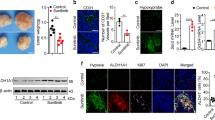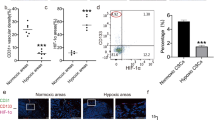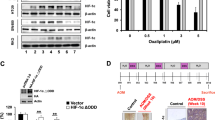Abstract
Preventing tumor neovascularisation is one of the strategies recently developed to limit the dissemination of cancer cells and apparition of metastases. Although these approaches could improve the existing treatments, a number of unexpected negative effects have been reported, mainly linked to the hypoxic condition and the subsequent induction of the pro-oncogenic hypoxia inducible factor(s) resulting from cancer cells’ oxygen starvation. Here, we checked in vivo on colon cancer cells an alternative approach. It is based on treatment with myo-inositol trispyrophosphate (ITPP), a molecule that leads to increased oxygenation of tumors. We provide evidence that ITPP increases the survival of mice in a model of carcinomatosis of human colon cancer cells implanted into the peritoneal cavity. ITPP also reduced the growth of subcutaneous colon cancer cells xenografted in nu/nu mice. In the subcutaneous tumors, ITPP stimulated the expression of the homeobox gene Cdx2 that is crucial for intestinal differentiation and that also has an anti-tumoral function. On this basis, human colon cancer cells were cultured in vitro in hypoxic conditions. Hypoxia was shown to decrease the level of Cdx2 protein, mRNA and the activity of the Cdx2 promoter. This decline was unrelated to the activation of HIF1α and HIF2α by hypoxia. However, it resulted from the activation of a phosphatidylinositol 3-kinases-like mitogen-activated protein kinase pathway, as assessed by the fact that LY294002 and U0126 restored high Cdx2 expression in hypoxia. Corroborating these results, U0126 recapitulated the increase of Cdx2 triggered by ITPP in subcutaneous colon tumor xenografts. The present study provides evidence that a chemical compound that increases oxygen pressure can antagonize the hypoxic setting and reduce the growth of human colon tumors implanted in nu/nu mice.
This is a preview of subscription content, access via your institution
Access options
Subscribe to this journal
Receive 50 print issues and online access
$259.00 per year
only $5.18 per issue
Buy this article
- Purchase on Springer Link
- Instant access to full article PDF
Prices may be subject to local taxes which are calculated during checkout



Similar content being viewed by others
References
Loges S, Mazzone M, Hohensinner P, Carmeliet P . Silencing or fueling metastasis with VEGF inhibitors: antiangiogenesis revisited. Cancer Cell 2009; 15: 167–170.
Kieda C, Greferath R, Crola da Silva C, Fylaktakidou KC, Lehn JM, Nicolau C . Suppression of hypoxia-induced Hif-1alpha and of angiogenesis in endothelial cells by myo-inositol trispyrophosphate-treated erythrocytes. Proc Natl Acad Sci USA 2006; 103: 15576–15581.
Biolo A, Greferath R, Siwik DA, Qin F, Valsky E, Fylaktakidou KC et al. Enhanced exercise capacity in mice with severe heart failure treated with an allosteric effector of hemoglobin, myo-inositol trispyrophosphate. Proc Natl Acad Sci USA 2009; 106: 1926–1929.
Sihn G, Walter T, Klein JC, Queguiner I, Iwao H, Nicolau C et al. Anti-angiogenic properties of myo-inositol trispyrophosphate in ovo and growth reduction of implanted glioma. FEBS Lett 2007; 581: 962–966.
Aprahamian M, Bour G, Akladios CY, Fylaktakidou K, Greferath R, Soler L et al. Myo-inositoltrispyrophosphate treatment leads to hif-1alpha suppression and eradication of early hepatoma tumors in rats. Chembiochem 2011; 12: 777–783.
Stringer EJ, Duluc I, Saandi T, Davidson I, Bialecka M, Sato T et al. Cdx2 determines the fate of postnatal endoderm. Development 2012; 139: 465–474.
Bonhomme C, Duluc I, Martin E, Chawengsaksophak K, Chenard MP, Kedinger M et al. The Cdx2 homeobox gene has a tumor suppressor function in the distal colon in addition to a homeotic role during gut development. Gut 2003; 52: 1465–1472.
Gross I, Duluc I, Benameur T, Calon A, Martin E, Brabletz T et al. The intestine-specific homeobox gene Cdx2 decreases mobility and antagonizes dissemination of colon cancer cells. Oncogene 2008; 27: 107–115.
Pearson JW, Fitzgerald D, Willingham MC, Wiltrout RH, Pastan I, Longo DL . Chemoimmunotoxin against a human colon tumor (HT29) xenografted in nude mice. Cancer Res 1989; 49: 3562–3567.
Verzi MP, Shin H, He HH, Sulahian R, Meyer CA, Montgomery RK et al. Differentiation-specific histone modifications reveal dynamic chromatin interactions and partners for the intestinal transcription factor CDX2. Dev Cell 2010; 19: 713–726.
Benahmed F, Gross I, Guenot D, Jehan F, Martin E, Domon-Dell C et al. The microenvironment controls CDX2 homeobox gene expression in colorectal cancer cells. Am J Pathol 2007; 170: 733–744.
Lorentz O, Duluc I, De Arcangelis A, Simon-Assmann P, Kedinger M, Freund JN . Key role of the Cdx2 homeobox gene in extracellular matrix-mediated intestinal cell differentiation. J Cell Biol 1997; 139: 1553–1569.
Turk N, Gross I, Gendry P, Stutzmann J, Freund JN, Kedinger M et al. Laminin isoforms: biological roles and effects on the intracellular distribution of nuclear proteins in intestinal epithelial cells. Exp Cell Res 2005; 303: 494–503.
Benahmed F, Gross I, Gaunt SJ, Beck F, Jehan F, Domon-Dell C et al. Multiple regulatory regions control the complex expression pattern of the mouse Cdx2 homeobox gene. Gastroenterology 2008; 135: 1238–1247.
Hinkel I, Duluc I, Martin E, Guenot D, Freund JN, Gross I . Cdx2 controls expression of the protocadherin Mucdhl, an inhibitor of growth and β-catenin activity in colon cancer cells. Gastroenterology 2012; 142: 875–885.
Renouf B, Soret C, Saandi T, Delalande F, Martin E, Vanier M et al. Cdx2 homeoprotein inhibits non-homologous end joining in colon cancer but not in leukemia cells. Nucl Acids Res 2012; 40: 3456–3469.
Pencreach E, Guerin E, Nicolet C, Lelong-Rebel I, Voegeli AC, Oudet P et al. Marked activity of irinotecan and rapamycin combination toward colon cancer cells in vivo and in vitro is mediated through cooperative modulation of the mammalian target of rapamycin/hypoxia-inducible factor-1alpha axis. Clin Cancer Res 2009; 15: 1297–1307.
Gross I, Lhermitte B, Domon-Dell C, Duluc I, Martin E, Gaiddon C et al. Phosphorylation of the homeotic tumor suppressor Cdx2 mediates its ubiquitin-dependent proteasome degradation. Oncogene 2005; 24: 7955–7963.
Marampon F, Bossi G, Ciccarelli C, Di Rocco A, Sacchi A, Pestell RG et al. MEK/ERK inhibitor U0126 affects in vitro and in vivo growth of embryonal rhabdomyosarcoma. Mol Cancer Ther 2009; 8: 543–551.
Acknowledgements
This work was supported by the INSERM (France), NormOxys Inc (USA) and the Ligue contre la Cancer du Haut-Rhin (France). Ms Saandi was supported by the AICR (UK) and the Département of Mayotte (France).
Author information
Authors and Affiliations
Corresponding author
Ethics declarations
Competing interests
Drs Nicolau and Lehn have received compensation as members of the scientific advisory board and own stock in NormOxys Inc, which holds the patents on the applications of inositol trispyrrophosphate. Drs Greferath and Tufa have consulted for NormOxys Inc and have received compensations. Ms Derbal-Wolfrom was a recipient of a funding by NormOxys Inc. Ms Martin and Drs Aprahamian, Pencreach, Choquet, Duluc and Freund declare no potential conflict of interest.
Rights and permissions
About this article
Cite this article
Derbal-Wolfrom, L., Pencreach, E., Saandi, T. et al. Increasing the oxygen load by treatment with myo-inositol trispyrophosphate reduces growth of colon cancer and modulates the intestine homeobox gene Cdx2. Oncogene 32, 4313–4318 (2013). https://doi.org/10.1038/onc.2012.445
Received:
Revised:
Accepted:
Published:
Issue Date:
DOI: https://doi.org/10.1038/onc.2012.445
Keywords
This article is cited by
-
Phase Ib dose-escalation study of the hypoxia-modifier Myo-inositol trispyrophosphate in patients with hepatopancreatobiliary tumors
Nature Communications (2021)
-
The 150 most important questions in cancer research and clinical oncology series: questions 76–85
Chinese Journal of Cancer (2017)
-
Development of OXY111A, a novel hypoxia-modifier as a potential antitumor agent in patients with hepato-pancreato-biliary neoplasms - Protocol of a first Ib/IIa clinical trial
BMC Cancer (2016)
-
Development of a methodology for in vivo follow-up of hepatocellular carcinoma in hepatocyte specific Trim24-null mice treated with myo-inositol trispyrophosphate
Journal of Experimental & Clinical Cancer Research (2016)



